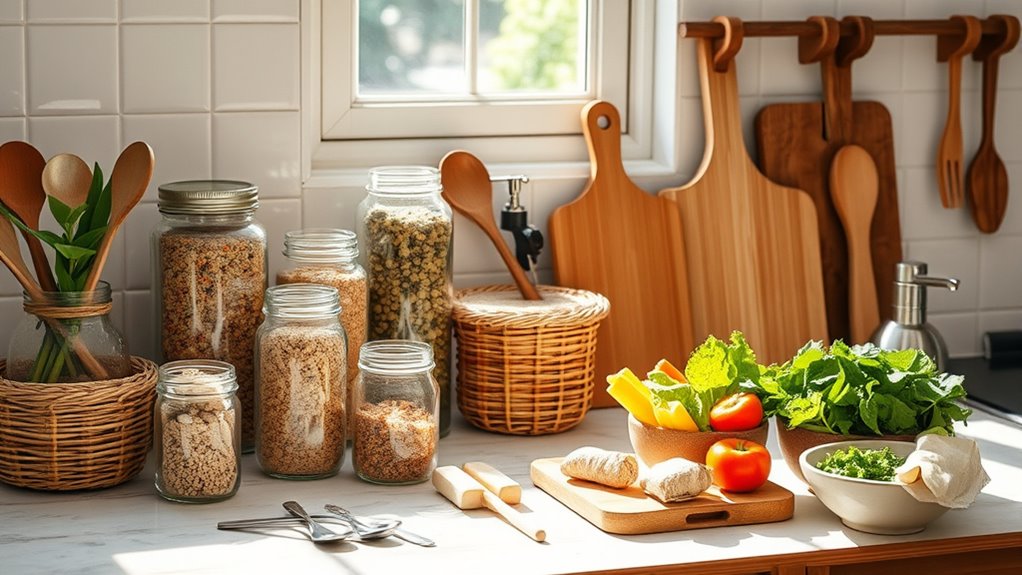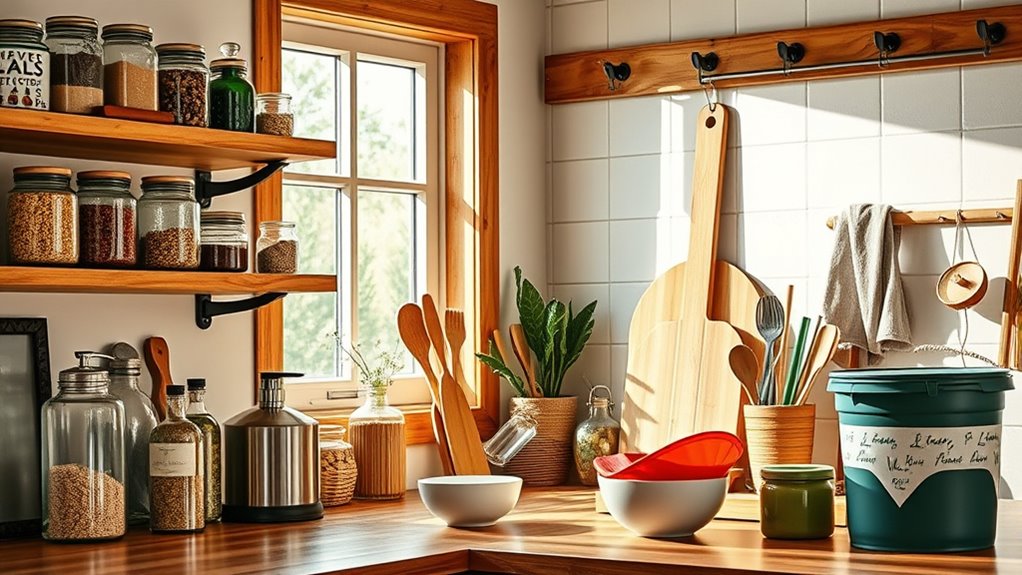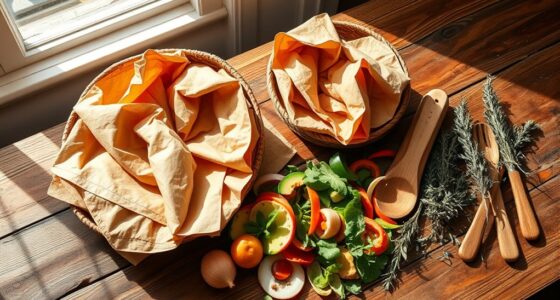Switching to reusable storage options like glass containers and silicone bags helps cut down on plastic waste and keeps your food fresh longer. Incorporate composting by diverting food scraps such as veggie peels and coffee grounds into compost bins, reducing landfill waste. Combining these habits makes your kitchen more eco-friendly and cost-effective. Keep going to discover more practical swaps that can transform your cooking habits and support a sustainable lifestyle.
Key Takeaways
- Replace plastic storage bags with silicone or glass containers for eco-friendly food storage.
- Use reusable beeswax wraps instead of plastic wrap to cover dishes and keep food fresh.
- Switch to stainless steel or glass utensils and cookware to minimize plastic use in cooking.
- Store kitchen scraps in reusable containers to facilitate composting and reduce plastic waste.
- Incorporate composting practices for food scraps, reducing landfill waste and promoting sustainable kitchen habits.

Many households are looking for simple ways to reduce plastic waste, and making eco-friendly swaps in your kitchen is a great place to start. One effective step is replacing single-use plastic containers with reusable storage options. Instead of relying on plastic wrap or disposable bags, consider investing in glass or stainless steel containers. They’re durable, safe for food storage, and can be used repeatedly, cutting down on waste. Silicone food storage bags also offer a flexible, eco-friendly alternative to plastic bags, allowing you to pack snacks or leftovers without contributing to the plastic pile-up. By choosing reusable storage, you not only decrease your plastic footprint but also often find that your food stays fresher longer.
Switch to reusable containers and silicone bags to cut plastic waste and keep food fresh longer.
Another key aspect of a plastic-free kitchen is adopting composting techniques. Composting transforms food scraps and yard waste into nutrient-rich soil, reducing the amount of waste sent to landfills. Many people are hesitant because they think composting is complicated, but it’s actually straightforward once you understand the basics. You can start small by composting fruit and vegetable peels, coffee grounds, eggshells, and yard waste. Use a compost bin or pile in your backyard, or opt for an indoor composting system if space is limited. This helps divert organic waste from the trash, where it would otherwise take years to decompose and emit harmful methane gases. Additionally, automation advances in waste processing are making composting more accessible and efficient for households.
Incorporating composting techniques into your routine complements your efforts to reduce plastic waste. For instance, instead of tossing banana peels or vegetable scraps into the trash, you add them to your compost bin. Over time, this process creates rich soil you can use in your garden or houseplants, closing the loop on your food cycle. Additionally, by using reusable storage containers, you can store your compostable scraps in a tidy, eco-friendly manner before adding them to your compost pile. This reduces the need for plastic bags or wraps for storage and keeps your kitchen cleaner.
Switching to reusable storage solutions and embracing composting techniques are simple yet impactful ways to make your kitchen more sustainable. These changes not only cut down on plastic waste but also foster a more environmentally conscious mindset. You’ll find that these swaps save money in the long run, minimize clutter, and help protect the planet. Making these adjustments might require some initial effort, but once they become part of your routine, you’ll enjoy a cleaner, greener kitchen that aligns with your values and contributes to a healthier environment.
Frequently Asked Questions
How Do I Store Leftovers Without Plastic Containers?
You can store leftovers without plastic containers by opting for compostable storage options or glass containers. Glass is durable, non-toxic, and keeps food fresh without leaching chemicals. Compostable storage bags or wraps are eco-friendly alternatives that break down naturally. By choosing these options, you reduce plastic waste and keep your leftovers safe and fresh, all while making your kitchen more sustainable and environmentally friendly.
Are There Eco-Friendly Alternatives to Plastic Wrap?
You’re looking for eco-friendly options to replace plastic wrap, and there’s no need to reinvent the wheel. Biodegradable wraps and beeswax alternatives are great choices, helping you cut down on waste. These options are not only better for the planet but also versatile for keeping your food fresh. Once you make the switch, you’ll see that going green doesn’t have to be a tall order—just a smart move.
Can I Find Plastic-Free Kitchen Tools That Are Affordable?
Yes, you can find affordable plastic-free kitchen tools. Look for reusable shopping bags made from cloth or jute, which are budget-friendly and durable. You can also choose compostable utensils crafted from bamboo or other sustainable materials. These options not only cost less over time but also help reduce plastic waste. By making these swaps, you support a more eco-friendly kitchen without breaking the bank.
How Do I Reduce Plastic in My Baking Supplies?
To reduce plastic in your baking supplies, start by choosing baking ingredient packaging made from paper or glass instead of plastic. Replace plastic measuring tools with stainless steel or bamboo options, which are durable and eco-friendly. You can also buy bulk ingredients to minimize packaging waste. These small swaps help cut down plastic use and make your baking more sustainable.
What Are the Best Reusable Options for On-The-Go Snacks?
Did you know that Americans throw away about 100 billion plastic snack bags annually? To cut down on waste, you should try reusable snack bags and stainless steel containers. Reusable snack bags are lightweight, easy to clean, and come in various fun designs, making them perfect for on-the-go snacks. Stainless steel containers are durable and keep your food fresh, making them a smart, eco-friendly choice for your busy lifestyle.
Conclusion
By making just a few simple swaps, you can substantially reduce plastic waste in your kitchen. Imagine cutting your plastic use by over 75%—that’s like removing three out of every four plastic items from your space. Every small change adds up, helping protect the environment and create a healthier home. So, start today; your efforts not only make your kitchen greener but also contribute to a cleaner planet for future generations.









